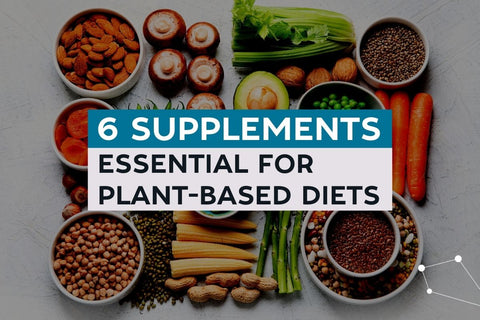The bottom line: Plant-based diets are more likely to result in suboptimal intakes of Zinc, Vitamin D, B12, iodine, iron and omega 3. Supplementation with these nutrients may help vegans and vegetarians attain healthy intakes of these essential vitamins and minerals, while making the most of the health benefits conferred by a predominantly plant-based diet.
Plant-based and vegetarian diets have grown popularity over the last decade with Vegan Australia estimating 400,000-500,00 thousand Australians following a plant-based lifestyle. Plant-based eating patterns have shown to be associated with several beneficial health outcomes.
Vegetarianism is characterised by a diversity and heterogeneity of dietary practices , with the exclusion of certain food groups such as meat, poultry, and similar products, and a focus mainly on fruits, vegetables, grains, pulses, nuts, seeds, and honey. The diet may include seafood, or eggs, dairy products, or both.
In contrast, the vegan diet is characterised by a complete abstinence of consumption of meat and food of animal origin, such as dairy, eggs, and honey, with a diet consisting solely of plant foods like grains, vegetables, fruits, legumes, nuts, seeds, and vegetable fats and oils.
There are a number of health benefits conferred by a plant-based diet including a reduction in risk of cardiovascular disease and diabetes, however there are also some risks associated with this lifestyle including nutritional deficiencies in certain vitamins, minerals and proteins that are usually sourced from animal products.
Whilst a vegan diet is abundant in phytochemicals and antioxidant vitamins, there can be significant deficiencies in certain vitamins like Vitamin B12 and Vitamin D, and minerals such as iodine, calcium, and zinc. Iron and zinc deficiency are both is far more common in vegans and non-meat eaters. Like iron, absorption of zinc is not as effective from plant sources as it is from animal sources.
Plant-based sources of iron can be consumed from legumes, beans, whole grains, fortified cereals, dark-green leafy vegetables, fruits, seeds, and nuts. However, serum levels of iron and ferritin (the form of iron stored in the body) have been shown to be lower in vegans than in non-vegans. The absorption of iron derived from haem is significantly higher compared to non-haem iron intake from plant foods. Complementing a plant-sourced iron intake with vitamin C, can help overcome its poor absorption characteristics. This is why it is important to take vitamin C, in conjunction with dietary iron supplements.
References:
1. Dynan N. 2018. Helping to meet the nutritional needs of patients, News GP; Royal Australian College of General Practitioners (RACGP), source: https://www1.racgp.org.au/newsgp/clinical/helping-to-meet-the-nutritional-needs-of-patients
2. Sakkas H. 2020. Medicina: Nutritional Status and the Influence of the Vegan diet on the Gut Microbiota and Human Health, source: https://www.ncbi.nlm.nih.gov/pmc/articles/PMC7073751/


